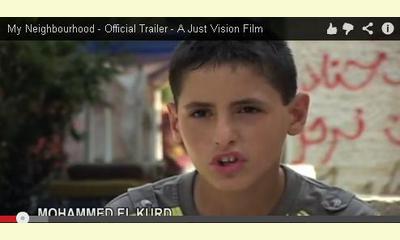|
|
Sheikh Jarrah: solidarity in a shared city (East Jerusalem)
an article by The Elders
Video: My Neighborhood (East Jerusalem)
In East Jerusalem, Israelis and Palestinians have
joined forces to protest settlement expansion into
Palestinian neighbourhoods. Six months after The
Elders last visited the region, a new documentary
tells the story of this shared struggle.

click on photo to enlarge
“Can you imagine living with someone you hate – in
the same house?”
Palestinian teenager Mohammed El Kurd lives in
Sheikh Jarrah, in the heart of East Jerusalem. When
he was 11, he returned from school one day to find
that Israeli settlers had taken over half of his
house.
Jerusalem is divided by the 1967 Green Line –
Israelis in the West, Palestinians in the East. But
the city remains fiercely contested, claimed by both
sides as their capital city in any eventual two-
state solution.
Amid these competing visions for Jerusalem, often
dominated by narratives of violence and exclusion,
voices calling for a shared, peaceful future are
often overlooked. A new documentary,
My Neighbourhood, tries to bring these voices
to the fore.
The film is set in Sheikh Jarrah, a neighbourhood in
Jerusalem’s Palestinian quarter. The area is home to
many Palestinian families who had fled fighting or
been expelled from their homes when the state of
Israel was created in 1948.
Although it lies east of the Green Line, outside
Israel’s territory, Israeli settlers are waging a
campaign for Jewish control of the area by
displacing the Palestinians who live there – often
using court-sanctioned evictions and occupying
Palestinian homes.
When the Elders
travelled to the Middle East last year to draw
attention to the imperilled two-state solution, Gro Harlem
Brundtland met with a group of Jerusalem
residents to discuss the increasing
restrictions Palestinians face in their daily
lives.
Mohammed, then 14, spoke about the impact of the
settlers’ actions on his family life: “They’re not a
family; they’re young men. They get paid to annoy
us. They say bad words when we pass, and spit at my
grandmother.”
Mohammed also described his surprise at
discovering that not all Israelis supported the
settlers’ actions. When Sheikh Jarrah’s residents
began to protest against the evictions of
Palestinian families, Mohammed was shocked to meet
Israelis willing to fight for his rights. Until
then, the only Jewish people he’d encountered had
been police officers or settlers:
“Three years ago, when the first demonstration
happened, I thought: how can they be Jewish? Until
I realised that not everyone is the same.”
My Neighbourhood charts how their campaign grows
from small, local protests to peaceful rallies
attracting thousands of people, documenting the
friendship and solidarity that develops between
the Palestinians struggling to stay in their
neighbourhood and the Israeli activists who
support them.
For Julia Bacha, who directed the film together
with Rebekah Wingert Jabi, this spirit of
cooperation represents a blueprint for Jerusalem
as “a shared city that sets a tone of cooperation
and mutual respect between Israelis and
Palestinians.”
Since the film was made, relations between
Palestinian residents and Israeli settlers have
grown increasingly tense and dozens of families in
Sheikh Jarrah still face the threat of eviction.
Visit 972
Magazine’s Sheikh Jarrah News Hub for the
latest developments.
|








|
DISCUSSION
Question(s) related to this article:
Jewish-Palestinian dialogue, How is dialogue different from conversation, discussion, or debate?
* * * * *
Latest reader comment:
Len and Libby Traubman have sent in the following important addition to their year-end review of the public peace process for Palestiinian-Jewish dialogue.
NEW INITIATIVE OF PROMINENT AMERICAN RELIGIOUS LEADERS FOR MIDDLE EAST PEACE
In December, 2003, a delegation of 33 of America's most prominent Jewish, Christian and Muslim religious leaders met in Washington, DC to announce their new, unprecedented, collaborative effort -- The National Interreligious Leadership Initiative for Peace in the Middle East.
These citizen-leaders of their faiths, and their plans, are described at:
http://www.walktheroadtopeace.org
They will continue working within their communities and together "to mobilize broad public support for active, determined and effective U.S. leadership in pursuit of peace between Israel, the Palestinians and Arab states."
They insist on a viable, independent, democratic Palestinian state alongside the existing state of Israel with enduring peace and security for both sides, thus amplifying the voices of increasing numbers of courageous Arabs and Jews of goodwill.
The Washington convergence was initiated by A Different Future (http://www.adifferentfuture.org), the U.S. Interreligious Committee for Peace in the Middle East
(http://www.usicpme.org), and the United Religions Initiative (http://www.uri.org) with initial financial support from the Nathan Cummings Foundation.

|
|









